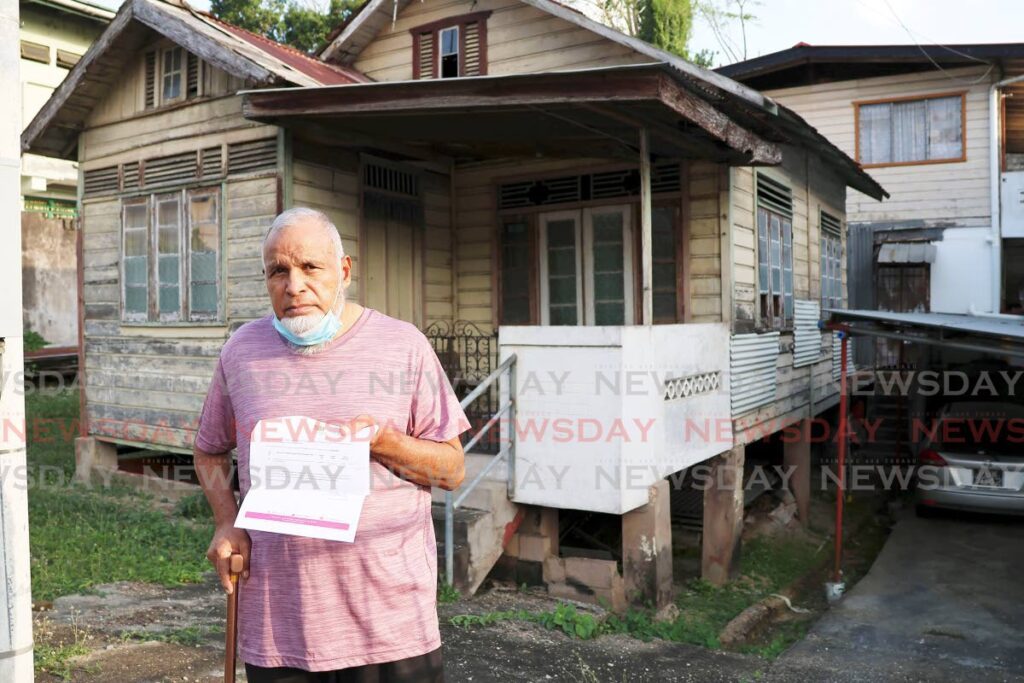Property tax – Implications for the elderly

As I understand it, our Constitution, section 4(a), states that the right to own property means that what you earn cannot be taken away from you without your agreement, except by law.
Forced labour was outlawed in 1834, except if you are in prison or in a tax bracket that, added to all your other tax obligations, takes away most, if not all, of what you work for.
But that is by law. So that is all right then. Once you have accepted employment, you have accepted the tax obligations that come with it.
Money devalues due to inflation at seven per cent per annum, my banker told me. The insurance agent who came to sell me life insurance 50 years ago in his sales pitch used the words: "If you are unfortunate enough to live to be really old, like 80..."
I was in my 30s at the time and thought he was crazy.
"Doesn’t everyone want to live to be at least that old?" I asked him.
He just looked at me pityingly.
Then I was taught that every employer has an obligation to tell new employees that there will be certain deductions made by law from what they earn.
These include PAYE, which is given to support the government, and NIS contributions, which are there to support you when you are sick, on maternity leave, or old and forced to retire, whether you want to or not.
I am not making this up. That is what I was told when I asked what benefit joining the then-new NIS would bring. I was also told I should start saving at least ten-20 per cent of everything left after these payments were deducted, as NIS pension was never intended, by itself, to be able to support me in my old age, that I would need to have savings.
My parents stressed that every woman should save toward having a property in her own name and earn enough to support her family in case her husband died, became disabled or deserted her and her children (which happened often in those days).
Which brings us to the proposed property tax.
If you work hard enough, you will get to pay PAYE, purchase tax, health tax, road tax and entertainment tax on everything you buy, eat or drink, all of which will support the government.
If you have been prudent and saved enough to buy or build a home, you will then have paid stamp duty and property tax, in addition to bank charges and the cost of the property itself, which you will not actually own until you have paid off your mortgage, if you had one.
I was not told how much this would cost me, though.
But all young people were assured that if you were sensible, you would pay off your mortgage before you retired, so that you would be secure in your old age.
And if the worst came, a fully paid-for home was an asset that could always be used to support you. Guidance for life, by the caring and diligent government, which, in return has given us police to protect us against crime, well, sort of, free and safe hospital care and free legal aid protection against wrongful and unfair charges. We get free bus passes in our old age and free transport to Tobago, sort of, if you know how to do it and a free internet connection.
Wait – that is not free. Sorry, I thought we were now a digital economy.
Having given you all that, in your old age, I am told by a driver who works for geriatrics who are no longer able to afford to own and drive vehicles that the elderly people he drives are concerned about the proposed property tax, a tax based on the assessed rental value of their homes.
Having chatted with several "assessors" as he waits for his geriatric clients, he learned that these government-employed fact-gatherers weren’t trained in property-value assessment, so made "good guesses."
How much this structureless exercise costs our vigilant and considerate government no one knows. I guess it’s expensive, though. Pre-election employment schemes always are.
Instead of going to the registry, where the cost of all properties bought or sold is already recorded, and adding a reasonable escalation or depreciation calculation, the government decided to determine, on what strange undergraduate basis no one knows, what the annual rentable value of each property is. Their wisdom hit the press with an $8,000 rental assessment for an old wooden house that could have been bought for less than that.
The rentable value of Finance Minister Colm Imbert’s elegant house in a high-rent district, on the other hand, by his own much-publicised report, was assessed as worth considerably less than 70-80-year-old properties in middle-class St Ann's, Woodbrook and Cascade.
As for rentable values, real-estate professionals say people are asking new questions about crime rates, drug houses, reliability of garbage collection, road conditions and how often electricity and water supplies fail before they want to even know rentals.
Elderly people surviving on fixed pensions know they cannot afford the new taxes. There is no age cap for the elderly on these taxes, as there is in other countries.
Is this the attentive government that advertises itself with the slogan: "We care"?

Comments
"Property tax – Implications for the elderly"